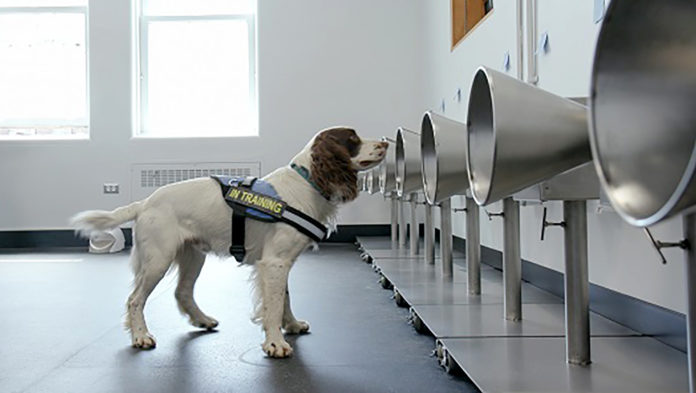If you were infected with COVID-19, this canine unit would be able to smell it on you.
Trained by the Canines for Care research group at Vancouver Coastal Health using thousands of samples from human volunteers, this hardworking trio of dogs are now experts in COVID-19 scent detection.
The dogs boast 100 percent sensitivity and 93 percent specificity in identifying saliva, breath and sweat samples samples from people infected with the SARS-CoV-2 virus in a laboratory setting. That makes them even better at their job than most rapid antigen tests.
Dogs have over 300 million olfactory (smell) receptors, which is why they are often trained to quickly sniff out particular items like drugs, explosives, or firearms. But Canines for Care uses their trainees to picks up invisible threats to human health, including infections and cancer. And they can often do it with an accuracy comparable to laboratory diagnostic tests.
Labrador retrievers Micro and Yoki and English springer spaniel Finn were chosen for training, as all are members of breeds specifically bred to hunt. They had never been trained for scent detection before, and their “green” status makes it less likely for them to signal a sample with another scent they may otherwise have been trained on previously.
The training process is set up as a fun game that the dogs enjoy playing. Samples are presented in a lineup of a dozen funnel-shaped scent stands. The trainee can walk up and sniff each one to get a good sniff. Afterwards, they signal the positive one by putting their head into the corresponding cone. If correct, they get an enthusiastic release command from their trainers, and a dispenser gives them a treat or a toy.
The researchers believe that it’s not just the virus, but our physiological response to infection that gives off the characteristic scent. The trained pups were tested by a third party laboratory to certify their success at detecting and signalling the right samples.
Prior to the pandemic, Canines for Care also successfully trained dogs to recognize C. difficile, which can cause severe diarrhea and life-threatening colon inflammation. Over half of infections are picked up in healthcare facilities.
These bacteria are very resilient and can live on surfaces for several months. Their spores can survive routine cleaning and hand sanitizers, making contamination a difficult problem for hospitals to solve.
Since 2016, the team has visited 32 Canadian healthcare facilities from coast to coast, searching hundreds of areas for C. difficile. The screens can take as little as half an hour to complete with 97 percent accuracy, pointing out specific surfaces for thorough disinfection.
The pandemic has highlighted the urgent need for fast and accurate diagnostic tools, and Health Canada has funded the COVID-19 canine scent detection program as part of its Safe Restart program. The team is currently working with Health Canada to decide where to deploy their trained sniffer dogs, and they envision their pack going to work in places like airports or sporting events. This quick method for identifying COVID-19 cases could give a safety boost in these high-density settings.








































